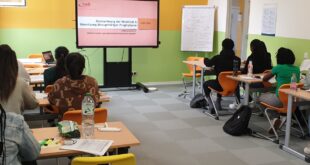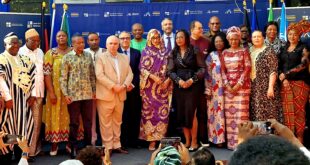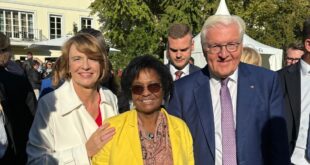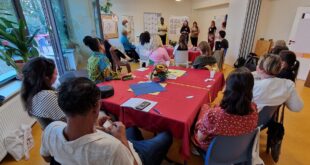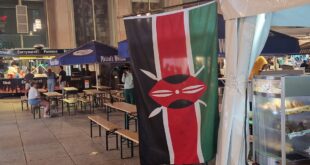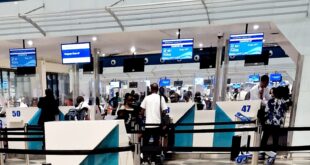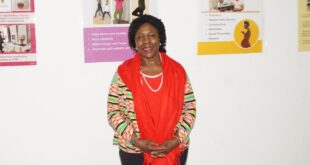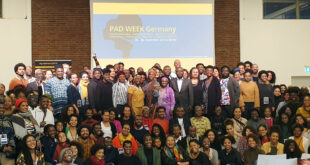EU countries have generously been welcoming of the refugees from Ukraine since the Russian invasion of the country on 24 February. These are largely spared bureaucratic hurdles as they receive residence permits without individual assessment and have access to the job market, welfare benefits and other social support.
In the shadow of the refugee crisis are the so-called third-country nationals (TNCs) without Ukrainian citizenship, including Africans, who have been displaced by the war and are seeking refuge across the bloc too. They are finding it difficult to settle down.
In Germany, while Ukrainian nationals are issued 2-year visa, TNCs are denied any firm residence permit. In some towns, they are issued permit for three months and sometimes for only 30 days. In Hamburg, international students from Ukraine receive a 6-month transitional resident permit (Fiktionsbescheinigung) which allows them to work and receive social welfare support. In many other towns and cities, such as Stuttgart, the provisional permit issued to TNCs precludes them from engaging in gainful employment.
In still other places, applications for protection are not accepted from TCNs at all; they are asked to return to their home countries.
“There were places where at the beginning there was some openness, such as Stuttgart, and now there is none. And conversely, also some places where the answers were mostly negative, that have improved slightly, such as Hamburg,” an activist supporting TNCs in Berlin noted.
The ensuing situation put the TNCs in a legal limbo, without future prospects with regard to work, housing, acquiring German language skills, training and studies.
The predicament of the affected Africans among the TNCs, mostly students from Nigeria, Sierra Leone, Côte d’Ivoire and Guinea, stems from the EU Temporary Protection Directive on the people displaced by the war in Ukraine, which entered into force on 4 March 2022.
Under the Directive, all EU member states are expected to issue Ukrainian nationals a 1-year residence permit, which is renewable twice, and provide them social welfare support and full access to the employment market. The same condition is applicable to refugees enjoying full protection in Ukraine.
The Directive however treats the situation of non-nationals living in Ukraine either permanently or on short term residency differently.
The foreign residents are supposed to be provided protection if they are not able to return safely and permanently to their home countries. While those who have permanent resident permit in Ukraine may be considered for protection, students are supposed to be able to return home.
However, for most of the students, returning home would impose a lot of hardship on them and their families. Many have studied for several years in Ukraine with some having only a few months left to graduate before the Russian invasion.
The students are afraid that if they went back home and the war becomes protracted, all their efforts and the money spent on their education by their parents would be wasted. Hence, the students would like to continue their studies in Germany.
According to an edict of the German government, refugees from Ukraine can enter the country without visa and stay in the country without a residence permit until 31 August. They are supposed to have applied for protection under Section 24 of the Residence Law by that date or fulfil the requirements for other types of permit under the same Law.
Qualifying for other forms of residence permit, such as to study, work or receive training, is hardly possible for most of the refugees in the short period of time left until this deadline due to the conditions that applicants have to fulfil.
For the TNCs, what comes after 31 August is uncertain. Will they be asked to leave the country? Those who have applied and are expecting a response are also uncertain about the outcome of their claim.
“Hardly any opportunities exist for them to settle down here, to orient themselves, to overcome the experiences of war and escaping war and to participate in society – and this despite the fact that they are just as affected by the war, escaping the war, and possibly even just as traumatized as Ukrainian nationals are,” explains Nora Brezger of the Refugee Council Berlin.
The sense of uncertainty is imposing enormous pressure on the TNCs, mostly young men and women who are facing such a situation for the first time in their lives, with many of them reported to be disoriented and some even suffering from depression as a result of the situation.
Many of the Africans are already traumatised having faced racism and discrimination while fleeing Ukraine. Some have also reported being treated badly by the German police on arrival.
A video of a Nigerian resident in Ukraine who graphically describes how the police in Frankfurt took him off a train and subjected him to degrading bodily search in their custody has gone viral.
“We are all humans we fled from Ukraine because of the war and we Africans experienced the hard way of coming here and we also lost many things – property, money and our education,” an exasperated student from Nigeria commented in a social media post.
The predicament of the TCNs has elicited the attention of refugee support groups, rights organisations and diaspora communities who have issued appeals to government to treat all refugees from Ukraine the same way.
Two Black German groups have launched online petition campaigns to call the attention of the German government to the situation of African students affected by the war in Ukraine.
Also, a group of activists supporting TCNs gathered on 17 May in Berlin to bring the situation of the refugees to the notice of the public and decision makers.
Under the motto Right to Stay, Equal Treatment and Reception Now! they rallied in front of the building housing the Bundesrat in central Berlin, where a preparatory meeting for the Conference of the Interior Ministers was taking place. The meeting was to prepare the agenda for the Conference scheduled for 1-3 June.
The organisers hoped that with their protest action, the government would put the situation of the TCNs on the agenda.
“We demand that Ukrainian refugees with third country nationalities be granted a residence title that allows them to rebuild their lives, including 2 years of residence, work and study permit and non-bureaucratic access to social welfare,” the coalition said.
On 24 May, a broader coalition of well established groups such as the Berlin Refugee Council, Pro Asyl, Amnesty International and many others issued an open letter to Ms Nancy Faeser, Federal Minister of the Interior, demanding that all refugees from Ukraine be treated equally.
The letter, issued for the attention of the Conference of the Interior Ministers, called for “a nationwide regulation that guarantees the protection of all people who have fled from Ukraine and an immediate stop to discrimination against third-country nationals and stateless persons from Ukraine”.
The letter calls for a nationwide regulation for a two-year right of residence for all refugees from Ukraine, “in order to create real protection and prospects for all people who had to flee the Russian war of aggression”.
Support groups and the TCNs are fervently hoping that the Conference of the Interior Ministers on 1-3 June will yield to the various appeals and agree on a solution that offers the refugees a succour from their traumatic experience and provide them long-term perspective in Germany.
Femi Awoniyi
 THE AFRICAN COURIER. Reporting Africa and its Diaspora! The African Courier is an international magazine published in Germany to report on Africa and the Diaspora African experience. The first issue of the bimonthly magazine appeared on the newsstands on 15 February 1998. The African Courier is a communication forum for European-African political, economic and cultural exchanges, and a voice for Africa in Europe.
THE AFRICAN COURIER. Reporting Africa and its Diaspora! The African Courier is an international magazine published in Germany to report on Africa and the Diaspora African experience. The first issue of the bimonthly magazine appeared on the newsstands on 15 February 1998. The African Courier is a communication forum for European-African political, economic and cultural exchanges, and a voice for Africa in Europe.







